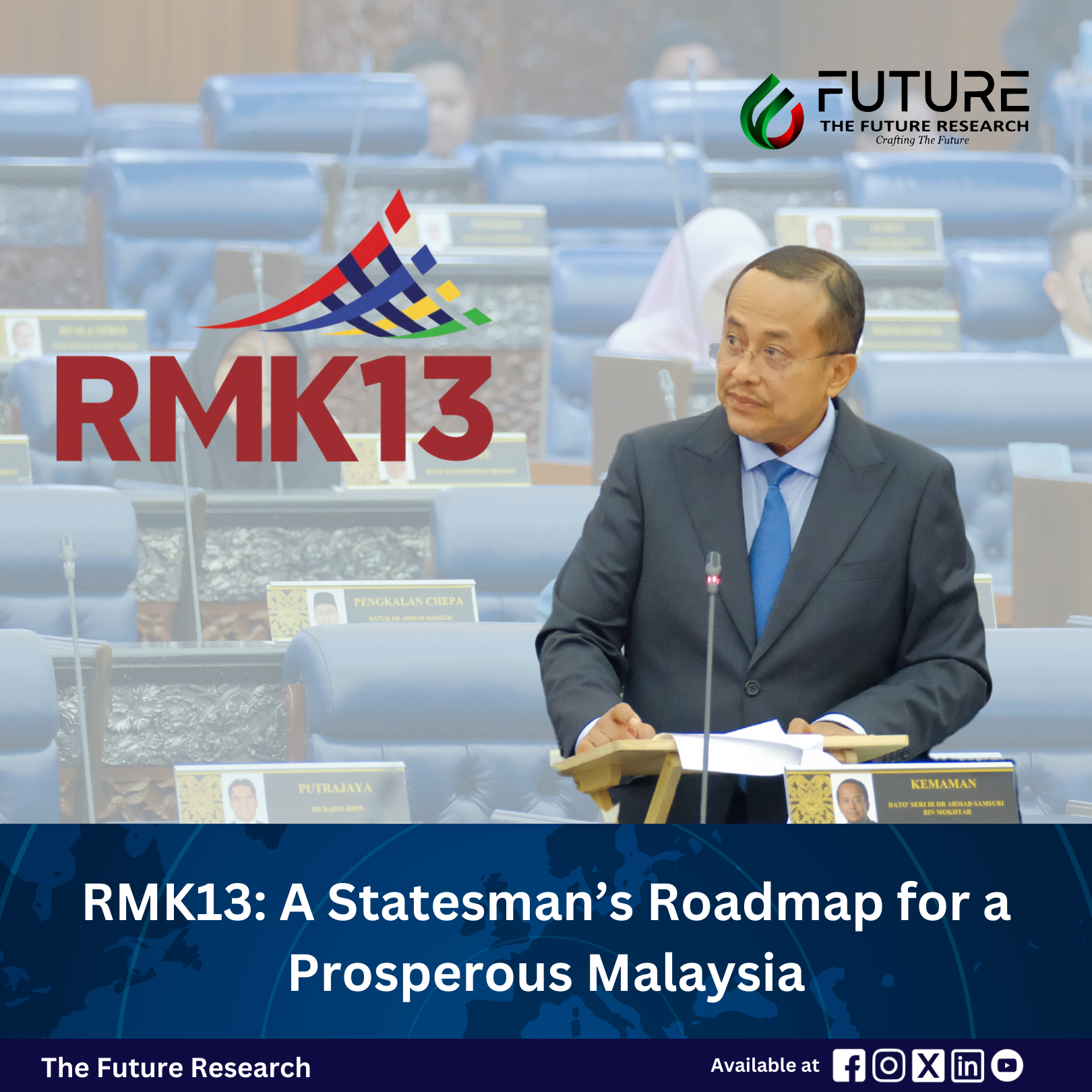In the recent parliamentary debate on the 13th Malaysia Plan (RMK13), Datuk Seri Ir Dr Ahmad Samsuri Mokhtar, Member of Parliament for Kemaman and Menteri Besar of Terengganu, delivered a speech that rose state level trajectory. It was not limited for state interests, but a blueprint for national rejuvenation. His address demonstrated a level of clarity, strategy, and vision in steering Malaysia towards equitable prosperity in an era marked by uncertainty and global competition.
The Future Research unpacks his core proposals, each rooted in a commitment to nationwide benefit, systemic reform, and a balanced federation.
1.Establishing a National Transformation Commission
Dr Ahmad Samsuri proposed the creation of an independent commission to study Malaysia’s transformation trajectory, audit the performance of past RMK cycles, and evaluate current procurement systems from the development of general and special grants to equitable revenue-sharing arrangements. This commission would ensure all states participate fully in shaping development priorities, reinvigorating the spirit of federalism and guaranteeing equitable distribution of national wealth. Such a mechanism would address long standing disparities and align fiscal governance with both transparency and inclusivity.
2.From RMK12 to RMK13: Raising the Bar for High Impact Investment
The MP for Kemaman emphasised that RMK13 must surpass RMK12 in ambition and execution. He underscored the importance of attracting high impact, high value investments as a key enabler for growth facilitated by robust infrastructure, from highways to large scale economic accelerators such as the East Coast Rail Link (ECRL). By linking economic corridors nationwide, Malaysia could achieve a multiplier effect across states positioning itself as a regional logistics and manufacturing hub.
3.Agriculture and National Food Security
In a world facing supply chain volatility, Dr Ahmad Samsuri urged for RMK13 to prioritise agriculture, fisheries, and aquaculture not merely as economic sectors, but as strategic security assets. Building a resilient national stockpile of food would shield Malaysia from global shocks, enhance rural incomes, and position the country as a regional food hub. This vision aligns with global megatrends emphasising sustainable resource management and climate resilient farming.
4.Tourism, TVET, and the Visit Malaysia Year 2026
He also emphasized that tourism must be supported with both fiscal and non fiscal incentives to ensure the sector’s readiness for Visit Malaysia Year 2026. Beyond marketing campaigns, this requires enhancing service quality, infrastructure, and product diversity. Dr Ahmad Samsuri also called for mainstreaming talent through the national Technical and Vocational Education and Training (TVET) policy creating a skilled workforce that bridges industry needs with economic opportunities.
5.Agriculture as a National Identity in the Age of AI
While embracing megatrends such as Artificial Intelligence and advanced technology, Dr Ahmad Samsuri suggested that Malaysia anchor its economic identity in a revitalised, tech-enabled agricultural sector. By blending heritage with innovation, Malaysia could differentiate itself globally, turning smart agriculture into a signature national brand.
6.Revisiting National Agendas for Accountability
The Kemaman MP stressed the need to review past national agendas by asking hard questions about their actual economic impact. Were these initiatives genuine growth drivers, or did they suffer from focus drift? This call for accountability signals a governance culture of results-driven values.
7.Rare Earth Elements (REE) — A National Centre of Excellence
Malaysia’s rare earth sector holds immense potential. Dr Ahmad Samsuri proposed establishing a National Centre of Excellence for REE, focusing on advanced material processing and zero waste recovery technologies. This would move Malaysia up the value chain from raw extraction to high-tech, high-value manufacturing.
8.Respecting State Rights Over REE
Under the Ninth Schedule of the Federal Constitution, REE falls under state jurisdiction. Dr Ahmad Samsuri revealed that states have often been excluded from federal negotiations — including reported US demands linking REE to tariff reductions. He advocated for states to be equal partners in resource diplomacy, ensuring that Malaysia’s strategic minerals benefit the entire federation.
9.Strategic Technologies as a National Niche
Dr Ahmad Samsuri concluded with a call for Malaysia to identify and champion strategic technologies — not only in research and development but also in commercialisation. He proposed a phased increase in R&D fiscal injection, effective monitoring mechanisms, and the cultivation of high quality human capital through targeted post doctorate programmes in high-impact fields. Strategic sectors such as smart agriculture, renewable energy, and halal biotechnology should be prioritised, with deep collaboration between the public sector, private industry, and academia.
A Vision Beyond Terengganu
While Dr Ahmad Samsuri is the Menteri Besar of Terengganu, his RMK13 proposals were unambiguously national in scope. The underlying philosophy of prosperity through equitable growth, technological leadership, and federal inclusivity resonates with the aspirations of Malaysians from all walks of life.
This speech signalled a leadership style that is proactive, data-driven, and anchored in long-term national interest. For the sake of our beloved country’s prosperous in both the intellectual rigour and practical roadmap to transform the nation, the Kemaman MP has positioned himself as a contender with the vision and the plan to match.
The Future Research
16 August 2025
Cyberjaya, Selangor


Leave a Reply